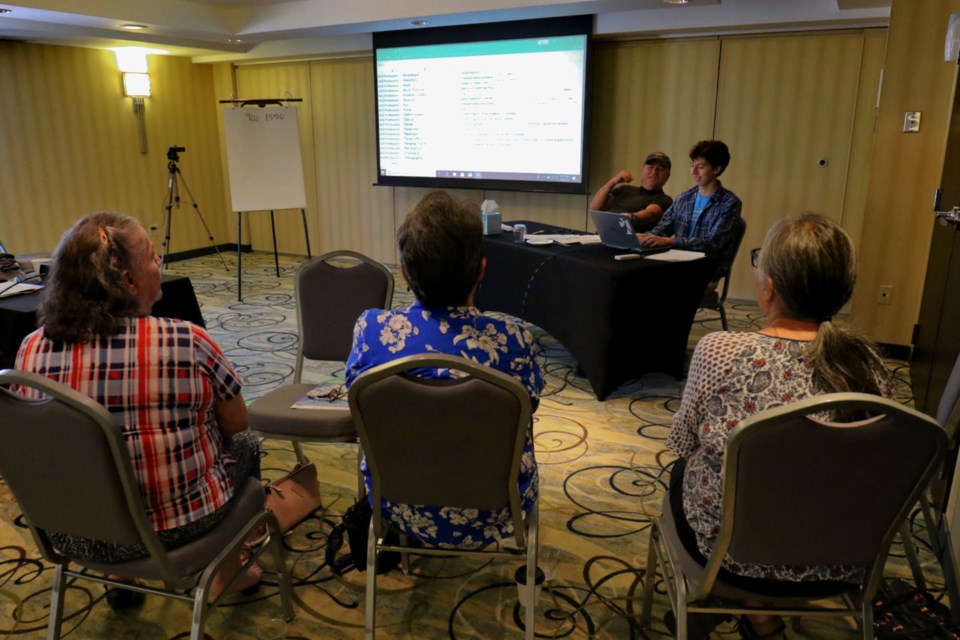Fluent speakers of Anishinaabemowin, also known as the Ojibwe language, gathered at Quattro Hotel and Conference Centre in Sault Ste. Marie this week to come up with new terminology to better reflect changing times.
The project, spearheaded by Shingwauk Education Trust, the modern languages department at Algoma University and Shingwauk Kinoomaage Gamig, saw 30 fluent speakers from across Ontario come together for the three-day conference.
“We’re gathering speakers of different dialects from Ontario, from as far north as Big Trout Lake - that’s north of Sioux Lookout - to Shoal Lake, which is near the Manitoba border, and all the way to Sarnia,” said Patricia Ningewance, an assistant professor at Algoma University who’s been teaching Anishinaabemowin for more than four decades. “We’re working on developing modern terminology, words that we didn’t have 150 years ago.”
“Some of them are everyday terms, other ones, of course, are not everyday terms - like pixel, you know, the technical words,” she continued. “The purpose is to try to standardize them, but that’s not the overall objective.”
Even some more of the obvious modern terms have yet to be standardized in Anishinaabemowin.
Ningewance says that she was sitting in on one of the terminology sessions Thursday morning, where speakers were discussing terms for vehicles and their components.
A speaker from Manitoulin Island used the word “boonzaabikiniganaabo,” which translates to ‘liquid that oils an engine,’ while another speaker from Gull Bay First Nation, a small community about 200 kilometres north of Thunder Bay, suggested a similar word that translates to ‘something that oils metal.’
Ningewance says that there’s a number of Ojibwe dialects throughout Ontario that differ region to region, and in some cases, community to community.
There’s even a dialect in the far reaches of northern Ontario that linguists refer to as Severn Ojibwe, but is more commonly known as Oji-Cree.
“It’s to come up with the words in our dialects, and if we come across a word that we all understand, that’s a big plus,” Ningewance said.
Learning a language once forbidden
Although the youngest participant at the terminology conference, Ningewance’s 20-year-old grandson Aandeg Muldrew, has become fluent enough in Anishinaabemowin to become a sessional language instructor at the University of Manitoba, these tales of language reclamation are few and far between among younger generations.
“We’re not passing it on to the children,” Ningewance said. “Even in the household, where the two parents speak the language, they won’t speak it to each other in the home. They’ll use English. I’ve seen that in my own household.”
Ningewance says that many people who want to teach Anishinaabemowin experience an emotional or psychological block, most likely stemming from the residential school experience, where many students were routinely punished and abused for speaking their language.
Many speakers are unable to pass the language down as a result.
Even Ningewance had to overcome the same block in order to teach her own grandson.
“We were silenced, I think, by being in residential schools where our language was forbidden,” she said.
Following a tour of the four conference rooms, SooToday met up with Jerry Sawanas, a member of Sandy Lake First Nation who’s currently living in Sioux Lookout.
Sawanas, a fluent speaker of Anishinaabemowin, used to translate at chiefs meetings, but now does play-by-play broadcasts for local hockey games in the language.
He says that working on modern terminology at the conference is an integral part of evolving the language in an effort to make younger generations understand who they are.
The loss of Anishinaabemowin throughout the younger generations, he says, goes hand-in-hand with loss of culture.
“If you don’t know that, there’s a big hole in your life, you never feel whole, you always feel like there’s something missing, and that’s a part of you,” Sawanas said.
“The language brings back a lot of that, that we’ve lost,” he continued. “So the hole gets smaller and smaller the more you learn about your culture, the more you learn about your language.”
“You have to know who you are before you can heal yourself.”
Anishinaabemowin resurgence
There are, however, signs of a resurgence in learning the language.
Ningewance points to a number of language immersion courses popping up throughout Anishinaabe territory, which surrounds the Great Lakes on both sides of the border.
This past spring, Algoma university hosted Anishinaabemowin immersion courses at Mukwa Lodge in Lac Seul First Nation, situated near Sioux Lookout.
Ningewance says that immersion camps are a response to the old ways of learning the language that didn’t work - teaching nouns, days of the week and numbers.
“There’s a new generation of young students that I meet, they know each other, they have kind of a network,” Ningewance said. “They go to Minnesota for immersion courses there, they have an immersion setting north of Elliot Lake.”
“There’s these really wonderful initiatives springing up.”
Ningewance, who teaches the Ojibwe language at Algoma University and spends her summers teaching language instructors at Lakehead University, is now concentrating on conversation while teaching vocabulary.
The goal, she says, is to get students to talk to each other in the classroom in order to express themselves, so they have enough vocabulary to engage in conversation.
“I’m developing ways for them to get past that emotional, psychological block by using humour, by using love, by using spirituality in the classroom.”
Now that the Anishinaabemowin Terminology Conference has wrapped up, the speakers will now ratify the new terms that they have agreed upon, and will eventually distribute those terms to Ojibwe language instructors throughout the province.
Shingwauk Kinoomaage Gamig says that more terminology conferences, like this one, will happen sometime in the future.
“It’s my dream come true, this is what I wanted to do for a long time,” Ningewance said. “I’ve been a language teacher for a long time, and I know the challenges our languages have.”
